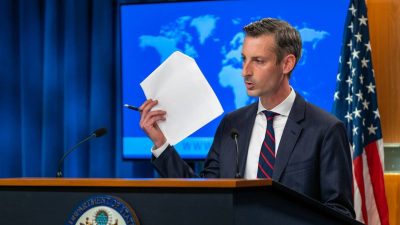Washington Says Iranian Response to JCPOA Revival ‘Not Constructive’
Iran has asked the US to provide strong guarantees to safeguard the nuclear deal, something Washington has been hesitant to do

All Global Research articles can be read in 51 languages by activating the “Translate Website” drop down menu on the top banner of our home page (Desktop version).
To receive Global Research’s Daily Newsletter (selected articles), click here.
Follow us on Instagram and Twitter and subscribe to our Telegram Channel. Feel free to repost and share widely Global Research articles.
***
US officials confirmed late on 1 September that they have received Tehran’s response to their proposals to revive the Joint Comprehensive Plan of Action (JCPOA), also known as the Iran nuclear deal.
However, Washington claims the text from Iran is “not constructive.”
“We can confirm that we have received Iran’s response through the EU,” a State Department spokesperson told reporters. “We are studying it and will respond through the EU, but unfortunately it is not constructive,” the official added.
Tehran sent its reply to Brussels on Thursday, one week after they received Washington’s observations on the EU-drafted proposal to revive the JCPOA and lift sanctions on Iran.
“The sent text has a constructive approach with the aim of finalizing the negotiations,” Foreign Ministry spokesperson Nasser Kanaani said in a statement.
The US unilaterally exited the JCPOA in 2018, before launching a so-called “maximum pressure” sanctions campaign on Iran.
After 16 months of talks between Tehran and the remaining signatories of the JCPOA – France, Germany, the UK, Russia, and China – on 8 August, EU foreign policy chief Josep Borrell announced that a final proposal had been drafted to revive the deal and welcome Washington back into the fold.
But the US has been hesitant about providing strong guarantees to Iran to confirm they will not withdraw from the deal once again. This is mainly due to strong pressure coming from Israel, as Tel Aviv has tried to sabotage the talks multiple times.
Ahead of Iran’s response on Thursday, Iranian Foreign Minister Hossein Amir-Abdollahian said during a trip to Moscow: “We need stronger guarantees from the other party to have a sustainable deal.”
This echoed comments made by Iranian President Ebrahim Raisi on Monday, when he highlighted the necessity of ending an investigation of Iran’s nuclear energy program by the International Atomic Energy Agency (IAEA) in order to restore the deal.
“[Without lifting the IAEA probe] it is meaningless to talk about an agreement,” Raisi said.
Iran has previously blasted the IAEA for being “hijacked and exploited” by Israel. They have also criticized the UN watchdog for their incessant probes of Iran’s nuclear energy program, as opposed to their indifference over Israel’s ample nuclear weapons arsenal.
According to western media reports this week, Washington warned Tehran against linking the UN probe of their “undeclared” nuclear activity to the reimplementation of the JCPOA, saying this could “delay the lifting of economic sanctions.”
*
Note to readers: Please click the share buttons above or below. Follow us on Instagram and Twitter and subscribe to our Telegram Channel. Feel free to repost and share widely Global Research articles.
Featured image is from the US State Department

